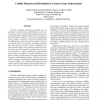Free Online Productivity Tools
i2Speak
i2Symbol
i2OCR
iTex2Img
iWeb2Print
iWeb2Shot
i2Type
iPdf2Split
iPdf2Merge
i2Bopomofo
i2Arabic
i2Style
i2Image
i2PDF
iLatex2Rtf
Sci2ools
121
click to vote
AINA
2007
IEEE
2007
IEEE
Conflict Detection and Resolution in Context-Aware Authorization
Pervasive computing environments introduce new requirements in expressiveness and flexibility of access control policies which are almost addressable leveraging contextual information. Although context-awareness augments the expressiveness of policies, it increases the probability of arising conflicts. Generally, context-aware authorizations are defined using some contextual constraints on the involved entities in an access request. Accordingly, principles like "more specific overrides", which are employed to resolve possible conflicts, are required to consider the contextual constraints. In this paper, we formalize the use of context constraints in a typical context-aware multi-authority policy model; each authority is capable of defining an expressive conflict resolution policy leveraging context-based precedence establishment principles. Based on the policy model, we propose a comprehensive graph-based approach to resolve conflicts. The strength of the approach is that co...
AINA 2007 | Computer Networks | Context-aware Multi-authority Policy | Contextual Constraints | Leveraging Contextual Information |
| Added | 12 Aug 2010 |
| Updated | 12 Aug 2010 |
| Type | Conference |
| Year | 2007 |
| Where | AINA |
| Authors | Amir Reza Masoumzadeh, Morteza Amini, Rasool Jalili |
Comments (0)

